
Two Leavens, Some Wholegrain and a Commercial Mixer. Nigel's November Baking Day
Two Leavens, Some Wholegrain and a Commercial Mixer
I wanted to use my new [very old!] 20 Quart Hobart dough mixer as soon as possible, so made a dough from the flour I had available today, after building both my rye sourdough and wheat levain over a couple of good feeds.
I only had around 40g of each culture in stock, but built each one with a feed Tuesday and Wednesday evenings to give me a working amount to build a great final dough today, Thursday.
Details are given below:
Material | Formula [% flour] | Recipe [grams] |
1 a. Wheat Levain |
|
|
Marriage’s Organic Strong White Flour | 16.67 | 400 |
Water | 10 | 240 |
TOTAL | 26.67 | 640 |
|
|
|
1b. Rye Sourdough |
|
|
Bacheldre Organic Dark Rye Flour | 8.75 | 210 |
Water | 14.58 | 350 |
TOTAL | 23.33 | 560 |
|
|
|
2. Final Dough |
|
|
Wheat Levain [from 1a.] | 26.67 | 640 |
Rye Sourdough [from 1b.] | 23.33 | 560 |
Marriage’s Organic Strong White Flour | 12.5 | 300 |
Carrs Special CC Flour | 16.67 | 400 |
Allinson’s Strong Wholemeal | 18.75 | 450 |
Gilchester’s Organic Pizza Flour | 25 | 600 |
Bacheldre Organic Dark Rye Flour | 1.66 | 40 |
Salt | 1.83 | 44 |
Water | 44.17 | 1060 |
TOTAL | 170.58 | 4094 |
|
|
|
% pre-fermented flour | 25.42 | - |
% overall hydration | 68.75 | - |
% wholegrain flour | 29.16 | - |
FACTOR | 24 | - |
Method:
- Build the 2 leavens as described above
- Firstly deposit the rye sourdough into the mixing bowl. Add weighed and tempered water to this, then add all the remaining flours. Leave out the salt and wheat levain, and mix for 3 minutes on first speed, using the hook attachment. Scrape down the bowl half way through the mixing time. Allow to autolyse for 1 hour.
- Add the wheat levain and salt and mix for 1 minute on slow speed. Scrape down the bowl, add a pinch of flour as needed, and mix on 2nd speed for 5 minutes. DDT 24°C
- Bulk ferment for 2½ hours, with one set of bold S&Fs after 2 hours.
- Scale and divide as follows: 2 @ 480g, 1 @ 960g, 1 @ 700g and the remaining piece, just short of 1500g. Mould round. Rest and prepare 5 bannetons. Re-mould and set upside down in the bannetons for bulk proof.
- Bulk proof time between 3 and 6 hours to fit schedule
- Bake in an electric oven with steam and on a stone. Cut the dough surface just prior to loading. I loaded each loaf to an oven pre-heated for 1 hour to 280°C. I used steam by misting the dough surface with water, and adding boiling water to a pan of hot stones on the base of the oven. The first 10 minutes the oven setting was 250°C, with the fan off. After that I lowered the heat to 215°C and switched over to fan convection on full power, and baked out each loaf. The 2 small loaves were baked simultaneously.
- Cool on wires
No wood in stock, which was a bit of a pain, given I had 5 loaves to bake off the same dough. Some loaves were proved in front of the fire, and some were held in the fridge for an hour to ensure smooth production schedule…that worked.
The dough was splendid! The mixer is a joy, and, the even fermentation at 24°C with gentle, but excellent development and generous hydration produced results as good as I could have hoped for.
Plenty wholegrain too!
The taste? I really rate this bread very highly. Let’s see what other local people think now…
Nigel's November Baking Day
On Saturday I managed to get up early for a change, so I could pay a visit to my friend and long time baking colleague, Nigel. It is actually all down to him that I ever got involved in the food industry, and baking in particular. Both of us were founder-members of the Red Herring Worker's Co-op in Newcastle, a business which Nigel had pioneered single-handedly for a few years already before we came together to create it as a formal business entity. That was way back in 1987!
Fast forward to our current situations, and we both seem to have wood-fired ovens built at our homes, and ready to use as an integral part to our imagined future destiny. Nigel, thank you so much for helping me to get my oven built in the first place. Apologies for not getting on board to help build your own monster; at the time I seem to remember having to defer my MSc for a year as teaching commitments at Newcastle College just about pulled me under a very big wave indeed.
Nigel's oven is a very big beast indeed. It gave me several big lessons when I went to help out on Saturday morning. Firstly there was well in excess of 100 loaves to bake. We also made a range of sweet and savoury pasties. Nigel had fired the oven hard the previous evening, and again from early Saturday morning [05:00] I arrived at 09:00 [he lives over 40 miles south from my home], and the oven was sitting happily at just under 350*C. We started baking at 11:00, just as we finished off most of the pasties, and moulded up a second batch of unbleached white loaves.
Well, it was a great chance to catch up with a lot of old friends. Some folks I hadn't seen for around 20 years. Other fellow "Herrings" came along, so too, Katie [of "Stout and Flax Seed Bread" fame] along with her Dad. It was a lovely sunny day, and I managed to grab some photos of Nigel's burgeoning bakery den, and he kindly took some snaps as I had a chance to set his lovely loaves, and to pull them, baked, from his wonderful oven.
Here's a few photos; you can see more on my flickr site, here:
http://www.flickr.com/photos/24731237@N03/sets/72157627995705763/
Very best wishes to you all
Andy






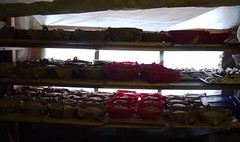
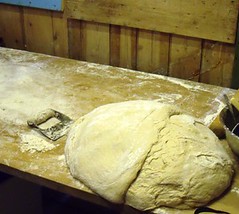
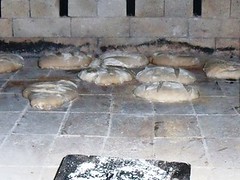
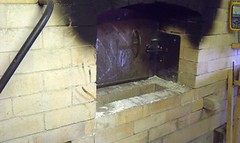
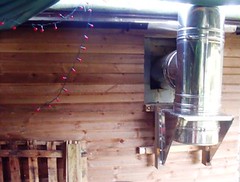
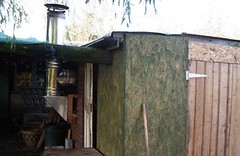
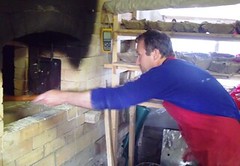
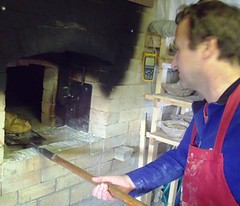
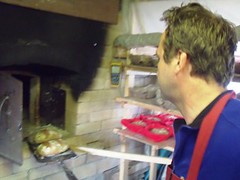
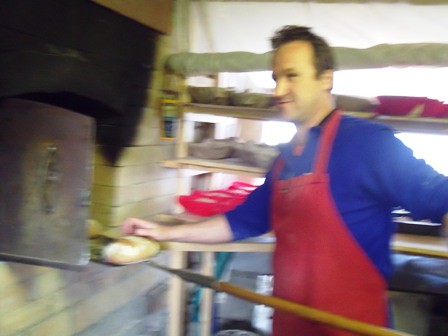


Comments
Glad to hear the mixer is working well. Just plug it in and switch it on?
I know all to well the joy of lining up bakes for a small oven and "creatively" proofing :)
Have you found homes for the bread yet? Shouldn't be difficult, they look great.
Cheers, Phil
Thank you Phil,
Yes the mixer came ready to use in my home kitchen; all I need now is a small table to stand it on.
Creative proofing is the secret to efficient baking schedules whatever level you operate at!
Took 3 loaves to a friend last night and she bought the lot! A fourth is a gift for friends tomorrow when we go out for a meal; the fifth was for us.
All good wishes
Andy
I like the effect of two different levains. 5 loaves huh? That's one powerful mixer!
Hi txfarmer,
I'm sold on using 2 leavens. Additional benefit is that it makes it easier to build up a decent quantity of leavening in a short time.
The mixer will make 2 to 3 times this amount of dough at a time if necessary, although I won't go over the 10kg mark. But it is when it comes to making more than one batch of dough that it comes into its own!
Really good to hear from you
Best wishes
Andy
Hello Andy,
What fine-looking bread...your customers will surely love it...and very happy to hear you are liking your new mixer!
:^) from breadsong
Hi breadsong,
Actually the new ovens I'm using give great crust in the finished bread. But you are right, the dough quality was great thanks to the new mixer.
Very best wishes to you
Andy
as a bakery gets started. Wish it were local. -Varda
Hi Varda,
I have been aware of the possibilities of what is achievable working from home in a baking context for some time; hence why I built the oven.
I am also acutely aware that there are limitations...quite obvious ones!
However, I intend to make the best of it as a means to open up new life opportunities for me, and for Alison, of course.
It is very local ,of course, but sorry it's not near you
Thank you for all your support
Best wishes
Andy
Great looking loaves, Andy. I really like the way the wholegrain stands out so beautifully in the crumb.
And, I can't help but ask, does the "A" go on the loaf that's for you?
Marcus
Hi Marcus,
Yes, that's the loaf I bagged as ours!
But scoring an "A" into the loaf is not a new trick, as you are probably aware.
The roots of it go back some years now, however, to when I used to assist on the Breadmatters courses and Andrew Whitley always made a Pain de Siegle loaf whilst all the delegates made Pain de Campagne. He used to score it with an "A", and that was always the loaf shared at dinner that evening.
I liked it best of all when used in the Gilchesters Miche, of course.
I totally agree about how the wholegrain flour works so well in these loaves.
Many thanks for your kind words
Best wishes
Andy
Looks like you had a great day of baking.
I have helped a friend of mine baking in his Alan Scott oven on occasions for farmers markets ... I always learn so much and leave for a home a little very envious :)
What particular lessons did you pick up from your bake with Nigel?
Cheers, Phil
Hi Phil,
Looks like a great little baking operation; nice photo of you on the sales stand too.
I think the big lesson was to relate to the relative sizes of my and Nigel's ovens, and fully appreciate the impact in terms of heat retention. I have really baked primarily on very big brick ovens. They take a lot of firing over a number of hours. However, they stay hot for a lot longer, too! The greater the mass of masonry the more fire required, but the longer the heat will be held. It is obvious, really. However, it is something I will have to work carefully with if I want to produce more bread from my oven. I'm not sure how much a long fire the day before will be of value, in terms of the heat that gets into the bricks and still remains. That's all up for experiment.
The other problem remains sourcing the right type of wood, and Nigel gave me some ideas there too. He goes and tidies the local timber merchant's yard from time to time in return for filling up his car with a load of unwanted off-cuts and pallet wood!
I should have expanded on this in the edited post; thanks for asking the question.
Best wishes
Andy
It is a nice little operation ... I really would like to be more involved in it, but commitments at home and the 2 hour drive make it tricky.
Ha, that photo is a shocker ... we had the roughest bake the day before (starch damaged wholemeal flour from a local biodynamic farmer ... wetter and wetter loaves ... yuk)
I can image the wood might be an issue over there...not so much here. The bakery is out on a farm and the local farmers clearing paddocks of ironbark trees bring trailer loads of chopped up wood. Not fair eh?
I find the oven management fascinating ... and I am still amazed at the heat retention of a well insulated masonry oven.
How many loaves do you fit per oven load?
All the best, phil
Hi Phil,
It depends on what the production schedule is, and the oven equipment available.
A busy night shift at Village Bakery would be in excess of 2000 loaves! Generally I would be running the shift from the dough mixing end, but the role of the oven man is crucial. There would be 4 of us in the shift team. Depending on loaf type the oven would hold anywhere between 200 and 500 loaves when filled. The secret was to make the doughs in an order, and at times which would allow the oven operator to bake the most, and the quickest. I don't think I've ever worked in a bakery where the oven is not the "governing factor", around which all production possibilities hinge.
Nigel reckons he can load 30 loaves to the hearth of his oven...he scales at 1.5lbs each [680g to me]. He expects to be able to bake 4 or 5 loads of this size before re-firing.
My oven remains a toy, in that I have not made any attempt to fire it hard and long in order to push through more bread. That has actually only become a real possibility now I have the Hobart mixer, of course. Remember also, that this means I always have to fire my little oven from cold. The more I use it, the easier management will become.
Starch-damaged flour....nothing worse!
All good wishes
Andy
from your writeups, Andy. Very best of luck with the direction this takes you.
Hi Louie,
I've not heard from you in a while.
It's good of you to post such kind words; thank you.
Best wishes
Andy
It sounds like a fun day you had Andy, teaming up with old baking pals and doing a good days work together. Nigel's oven is a beauty and I like his shop set up as well. I've imagined doing something similar on our property when I retire in a few years but local by-laws would never permit it, much less our Provincial Health and Safety regulations. I'm guessing you don't have the same kind of restrictions for home based food production in Britain that we have in Canada.
New equipment to use is always a treat, so it's good to see your new mixer is everything you hoped it would be. Clearly you're putting it to good use with this latest bake of yours. All excellent looking loaves in every aspect! You must be enjoying not having to rely on the old 'Armstrong' method of home mixing after all this time, in addition to the increased production level the mixer affords you. Whatever type of mixing you choose to use it always results in the high quality loaves I've come accustomed to seeing in your posts. Great baking as always Andy!
All the best,
Franko
Hi Franko,
I'm not expecting an easy ride from our Environmental Health Officer when I go to register my kitchen as food premises. I am aware I have to do this as a legal requirement. I'm waiting for a handwash basin to be fitted first; that's imminent. Without that, I'll get nowhere. I don't know what they will say about a wood-fired brick oven on the patio???!
However, the artisan food movement in the UK is now well underway. Additionally, there is large unemployment over here as we continue to bump along the bottom of the economic pit thanks to the greedy ones who are supposed to make money to boost the economy, not keep it for themselves in the form of rewards undeserved. So, the govt. are under much pressure to relax red tape...it is, afterall, a major plank of Tory ethos to help business by cutting red tape. So, I'm quietly optimistic, even though there are obvious barriers. I don't know what they will make of Nigel's outdoor set up?
Your comments about the bread are generous as always, and very much appreciated. The mixer will indeed be of great benefit as I gradually upscale.
Great to hear from you as always Franko
Best wishes to you
Andy
It's always interesting to hear of your baking experiences, Andy, and see your great results (I'm glad to learn, by the way, that the "A" on the bread doesn't mean "adulterated" :)
I have an old 20-qt. Hobart mixer, too, for my larger batch baking, it works great and is really powerful.
Can you do me a favor and share the formula for the gluten free bread you mentioned in another thread? I trying out different gluten free breads for a friend with intolerance, and you only mentioned the ingredients, but not the amounts or percentages. You had chestnut flour in there, and said that you achieved a good result with a minimum amount of xanthan gum.
Karin
Hi Karin,
This is just a trifle adulterated...sorry!
If I were looking to advance the gluten free knowledge and techniques, I think my first port of call would be Sharon, here:
http://glutenfreesourdough.blogspot.com/ and http://www.thefreshloaf.com/blog/sharonk
But this is something I came up with around 2004. It's ok. You could try it "unadulterated", perhaps?
GLUTEN FREE BREAD
Recipe for 2 small loaves.
Ingredient
As % of “flour”
Grammes
Chestnut Flour
20
100
Corn Starch
10
50
Rice Cones
20
100
Maize Grits
20
100
Manioc Starch
20
100
Soya Flour
10
50
Salt
1.8
9
“Metolose”
0.4
2
Yeast
3.5
17.5
Cider Vinegar
5
25
Water
80
400
Sesame Seeds
5
25
Blue Maw Seeds
5
25
TOTALS
200.7
1003.5
Notes: Use Hazelnut Flour instead of Chestnut Flour if necessary.
Use Xanthan Gum as a substitute for Metolose [methylcellulose].
Extra seeds are required as a topping for the bread, as the baked
loaves tend to be devoid of colour.
Baking: 210°C. Heat: top 6, bottom 8 in a deck oven for 45 minutes.
METHODDe-tin and cool on wires.
Alison's christened the mixer "Hoby". I don't know what to make of that!
Really good to hear from you
Very best wishes
Andy
Thank you so much!
I tried two different kinds of GF breads so far, the Basic Sourdough from Jean Leighton (gfdoctorrecipes.com) and another one, both turned out much better tasting and performing, than I expected.
Maybe I should christen my Hobart, too, since it is such an important part of our kitchen...
Karin
Hi Karin,
This is just my lovely wife teasing me...in an oh so gentle way, of course!
The chestnut flour brings a lot to the taste of the GF bread; wonderful sweetness in taste.
Best wishes
andy